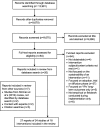The sustainability of public health interventions in schools: a systematic review
- PMID: 31906983
- PMCID: PMC6945701
- DOI: 10.1186/s13012-019-0961-8
The sustainability of public health interventions in schools: a systematic review
Abstract
Background: The sustainability of school-based health interventions after external funds and/or other resources end has been relatively unexplored in comparison to health care. If effective interventions discontinue, new practices cannot reach wider student populations and investment in implementation is wasted. This review asked: What evidence exists about the sustainability of school-based public health interventions? Do schools sustain public health interventions once start-up funds end? What are the barriers and facilitators affecting the sustainability of public health interventions in schools in high-income countries?
Methods: Seven bibliographic databases and 15 websites were searched. References and citations of included studies were searched, and experts and authors were contacted to identify relevant studies. We included reports published from 1996 onwards. References were screened on title/abstract, and those included were screened on full report. We conducted data extraction and appraisal using an existing tool. Extracted data were qualitatively synthesised for common themes, using May's General Theory of Implementation (2013) as a conceptual framework.
Results: Of the 9677 unique references identified through database searching and other search strategies, 24 studies of 18 interventions were included in the review. No interventions were sustained in their entirety; all had some components that were sustained by some schools or staff, bar one that was completely discontinued. No discernible relationship was found between evidence of effectiveness and sustainability. Key facilitators included commitment/support from senior leaders, staff observing a positive impact on students' engagement and wellbeing, and staff confidence in delivering health promotion and belief in its value. Important contextual barriers emerged: the norm of prioritising educational outcomes under time and resource constraints, insufficient funding/resources, staff turnover and a lack of ongoing training. Adaptation of the intervention to existing routines and changing contexts appeared to be part of the sustainability process.
Conclusions: Existing evidence suggests that sustainability depends upon schools developing and retaining senior leaders and staff that are knowledgeable, skilled and motivated to continue delivering health promotion through ever-changing circumstances. Evidence of effectiveness did not appear to be an influential factor. However, methodologically stronger primary research, informed by theory, is needed.
Trial registration: The review was registered on PROSPERO: CRD42017076320, Sep. 2017.
Keywords: Institutionalisation; Organisational change; School health; Sustainability; Systematic review.
Conflict of interest statement
The authors declare that they have no competing interests.
Figures
References
-
- WHO . Ottawa Charter for Health Promotion. Ottawa: World Health Organization; 1986.
-
- WHO . Promoting health through schools: report of a WHO expert committee on comprehensive school health education and promotion. Geneva: World Health Organization; 1997. - PubMed
-
- Brown T, Summerbell C. Systematic review of school-based interventions that focus on changing dietary intake and physical activity levels to prevent childhood obesity: an update to the obesity guidance produced by the National Institute for Health and Clinical Excellence. Obes Rev. 2009;10:110–141. doi: 10.1111/j.1467-789X.2008.00515.x. - DOI - PubMed
-
- Kriemler S, Meyer U, Martin E, van Sluijs EMF, Andersen LB, Martin BW. Effect of school-based interventions on physical activity and fitness in children and adolescents: a review of reviews and systematic update. Br J Sports Med. 2011;45:923–930. doi: 10.1136/bjsports-2011-090186. - DOI - PMC - PubMed
Publication types
MeSH terms
LinkOut - more resources
Full Text Sources
Medical



